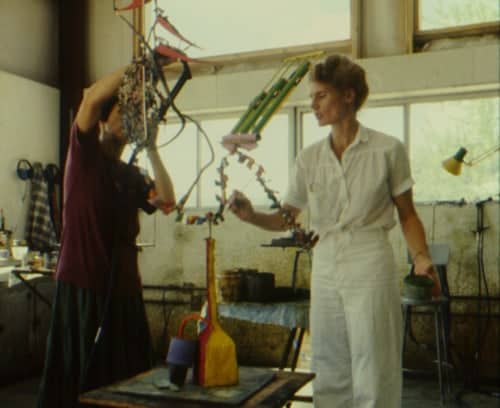You have reached the end of the best results we have for you.
Genres:
Sell Nancy Graves artwork with us. We will research its value and popularity for you.

Nancy Graves stands as a pioneering figure in the realm of contemporary art, celebrated for her innovative approach to sculpture and mixed media. From her early experiments with animal forms to her later explorations of cultural anthropology and scientific inquiry, Graves's artistic journey is a testament to her boundless creativity and intellectual curiosity.
Early Life and Education:
Nancy Graves was born in Pittsfield, Massachusetts, in 1939. From a young age, she displayed a keen interest in art and the natural world, drawing inspiration from her surroundings and her father's work as a geologist. Graves's passion for sculpture was evident early on, prompting her to pursue formal training in the arts.
After attending Vassar College, where she studied painting and sculpture, Graves went on to earn her MFA from Yale University School of Art and Architecture in 1964. It was during her time at Yale that she began to experiment with unconventional materials and techniques, laying the groundwork for her distinctive artistic style.
Artistic Style and Influences:
Graves's artistic style defied categorization, drawing from a diverse range of influences that spanned art history, science, anthropology, and beyond. Her early sculptures, characterized by their biomorphic forms and tactile textures, reflected her fascination with the natural world and the animal kingdom.
In the late 1960s and early 1970s, Graves's work took a dramatic turn as she delved into the realms of cultural anthropology and archaeology. Inspired by her travels to places like Mexico, Egypt, and Kenya, she began incorporating elements of ancient civilizations and primitive art into her sculptures, creating hybrid forms that blurred the boundaries between past and present, myth and reality.
Breakthrough Works and Recognition:
One of Graves's most significant breakthroughs came in 1969 with her series of camel sculptures, which garnered widespread acclaim for their innovative use of materials and their expressive, almost anthropomorphic, qualities. These sculptures, created using a combination of plaster, burlap, and paint, exemplified Graves's ability to imbue inanimate objects with a sense of vitality and presence.
Throughout the 1970s and 1980s, Graves continued to push the boundaries of sculpture, experimenting with new materials such as bronze, steel, and Plexiglas. Her "Prototypes of Lost Worlds" series, created in the late 1970s, featured large-scale sculptures inspired by prehistoric fossils and artifacts, showcasing Graves's fascination with the intersections of art, science, and history.
Legacy and Impact:
Nancy Graves's impact on the art world extends far beyond her own body of work. As one of the first women to achieve widespread recognition in the male-dominated field of sculpture, she paved the way for future generations of female artists to pursue their creative ambitions unapologetically.
Graves's interdisciplinary approach to art, which encompassed sculpture, painting, drawing, printmaking, and film, continues to inspire artists working across diverse mediums today. Her relentless curiosity, coupled with her commitment to pushing the boundaries of artistic expression, remains a guiding light for those who seek to challenge conventions and explore new frontiers in art.
Nancy Graves Artworks:
Nancy Graves was a versatile and innovative artist who worked across various mediums, including sculpture, painting, drawing, printmaking, and film. Throughout her career, she explored a wide range of themes and subjects, often drawing inspiration from the natural world, cultural anthropology, and scientific inquiry. Here are some of the key types of art that Nancy Graves created:
Nancy Graves Sculptures:
Graves is perhaps best known for her sculptural works, which encompassed a diverse range of forms and materials. In her early sculptures, she often explored biomorphic shapes and textures, creating abstracted representations of animals and organic forms. One of her most famous series of sculptures featured camels, which she depicted with expressive, almost anthropomorphic qualities. Graves experimented with materials such as plaster, burlap, bronze, steel, and Plexiglas, pushing the boundaries of traditional sculpture and blurring the lines between abstraction and representation.
Nancy Graves Paintings:
In addition to her sculptural works, Graves was also a prolific painter. Her paintings often echoed the themes and motifs found in her sculptures, featuring bold colors, dynamic compositions, and a sense of movement and energy. Graves's paintings ranged from abstract explorations of form and color to more figurative depictions of animals, landscapes, and archaeological artifacts. Her use of texture and layering added depth and complexity to her canvases, inviting viewers to explore the rich visual tapestry of her artistic vision.
Nancy Graves Drawings:
Drawing played a crucial role in Graves's artistic practice, serving as a means of exploration, experimentation, and expression. Her drawings ranged from quick sketches and studies to more detailed and elaborate compositions. Graves's drawings often served as preliminary studies for her sculptures and paintings, allowing her to refine her ideas and concepts before translating them into three-dimensional form. Her drawings showcased her mastery of line, form, and composition, capturing the essence of her subjects with precision and sensitivity.
Nancy Graves Printmaking:
Graves was also skilled in the art of printmaking, using techniques such as lithography, etching, and screen printing to create a diverse array of prints. Her prints often featured the same bold colors, dynamic compositions, and playful experimentation found in her other works. Graves's prints ranged from abstract geometries to figurative representations, showcasing her versatility and mastery of the medium.
Nancy Graves Film:
In addition to her work in the visual arts, Graves was also an accomplished filmmaker. She produced a number of experimental films that explored themes related to nature, movement, and perception. Graves's films often featured abstract imagery and rhythmic editing, creating immersive sensory experiences for viewers.
Overall, Nancy Graves's artistic legacy is one of innovation, exploration, and fearless creativity. From her early experiments with animal forms to her later explorations of cultural anthropology and scientific inquiry, Graves's work transcends traditional boundaries, inviting viewers to question, contemplate, and marvel at the wonders of the natural world and the human imagination.